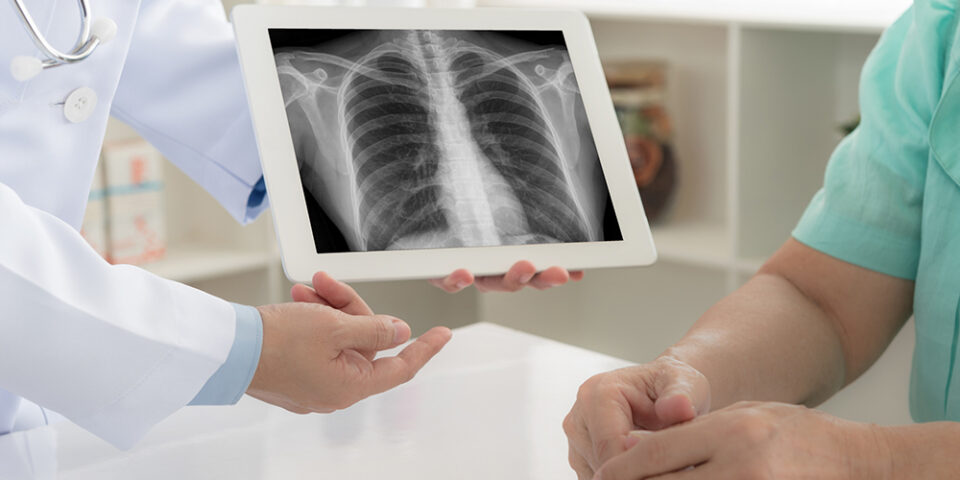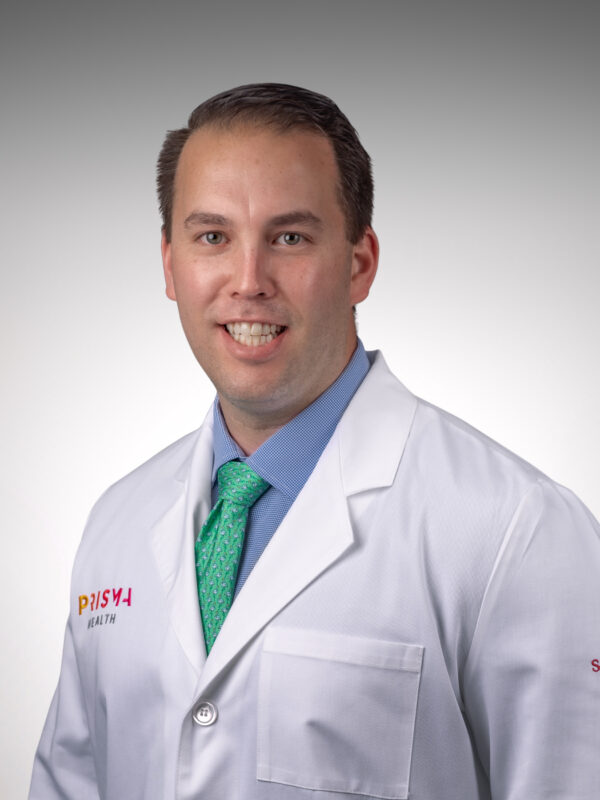Is emphysema the same as COPD?
According to the American Lung Association, over three million people in the United States currently have emphysema. The CDC states that 16 million people currently live with COPD, or chronic obstructive pulmonary disease. While these conditions are often considered one and the same, that isn’t quite the case. But how is emphysema different than COPD?
Pulmonologist and critical care specialist Matthew Varner, DO, spoke with us about how emphysema differs from COPD and more.
What is emphysema?
“Emphysema involves damage to the air sacs in the lungs, causing them to lose elasticity,” said Dr. Varner. “Essentially, it becomes more and more difficult for the lungs to expand and contract, especially when exhaling.”
Dr. Varner noted that emphysema develops slowly, and often people struggling with it don’t report symptoms until the disease has been developing for quite some time.
Is emphysema the same as COPD?
“Emphysema is a type of COPD, or chronic obstructive pulmonary disease,” said Dr. Varner. “But COPD doesn’t always show up as emphysema. It can also include chronic bronchitis.”
Emphysema causes damage to the air sacs, or alveoli, within the lungs, while with chronic bronchitis the airways become inflamed and narrowed thanks to overproduction of mucus. Dr. Varner added that many people with COPD are dealing with a combination of the two conditions, not just one or the other.
What causes emphysema? Is it hereditary?
“Primarily, emphysema develops as a result of exposure to airborne irritants over time,” said Dr. Varner. “The most significant risk factor is smoking, followed by secondhand smoke, air pollution exposure, chemical fumes or ongoing exposure to lots of dust, seen most often in people who have work exposure in industries like mining or manufacturing.”
There is one risk factor that does run in families. Known as alpha-1 antitrypsin deficiency, it can also lead to emphysema. This deficiency is genetic and causes the lungs to be less able to protect themselves from damage. Those with this deficiency are more susceptible to developing emphysema, especially if they smoke or are exposed to other lung irritants.
How is emphysema treated? Can emphysema be cured?
“Simply put, the damage already done to the lungs by emphysema is not reversible,” said Dr. Varner. “The condition isn’t curable. The good news, though, is that we are able to treat symptoms and improve your quality of life.”
Dr. Varner noted a few lifestyle changes you can make on your own that help to slow disease progression or reduce symptoms, like quitting smoking. Those who want to quit smoking might find it helpful to join smoking cessation programs, to speak with their doctor about medications that can help to reduce cravings or potentially be referred for counseling.
It’s also helpful to make a point to stay away from secondhand smoke, air pollution, chemical fumes and other lung irritants. Regular, low-impact exercise improves lung capacity and overall stamina, while receiving flu and pneumococcal vaccinations help to keep you safe from respiratory infections that can become very dangerous in damaged lungs.
Are there any medications to treat emphysema? What about other emphysema treatment options?
“We absolutely do have some medications and other therapies that can help make your symptoms less severe or encourage you to improve the strength and stamina of your lungs,” said Dr. Varner. “Albuterol, often associated with asthma, and other bronchodilators help to relax your airways and make breathing easier.”
Inhaled corticosteroids and phosphodiesterase-4 inhibitors work to reduce lung inflammation, while those with the genetic AATD component may receive regular infusions of the AAT protein to slow lung damage.
“People living with COPD or emphysema often benefit from pulmonary rehabilitation, a structured program that includes exercise, breathing techniques and education designed to improve lung function and endurance,” said Dr. Varner. “Supplemental oxygen may be prescribed for those with low blood oxygen levels, and it reduces shortness of breath and improves energy levels.”
Finally, surgical options like bronchoscopic lung volume reduction or bullectomy help to reduce symptoms by removing the damaged lung tissue or lessening the ongoing hyperinflation of the lungs.
In severe, advanced cases, some people struggling with COPD and emphysema may be eligible to receive a lung transplant.
Are there things you shouldn’t eat or drink if you have emphysema?
“While there is no specific diet designed for emphysema, certain types or food or drinks can absolutely worsen symptoms or make breathing more difficult,” said Dr. Varner. “We do have some items we tell patients to limit or even avoid.”
Foods to avoid or limit if you have emphysema include:
- Salty foods: Excess sodium can cause fluid retention, which may make breathing harder. Avoid processed foods, canned soups and salty snacks.
- Carbonated beverages: Soda and sparkling water can cause bloating, which may press on the diaphragm and make breathing more difficult.
- Fried or fatty foods: These can cause bloating and indigestion, making breathing uncomfortable. They may also contribute to weight gain, which can strain the lungs.
- Gas-producing foods: Foods like beans, broccoli, cabbage and onions can cause bloating and discomfort.
- Alcohol: Can interfere with medications, worsen dehydration and suppress the immune system, increasing infection risk.
- Sugary foods and drinks: Excess sugar can contribute to inflammation and weight gain, which may worsen symptoms.
Dr. Varner has some advice on what to add to your diet to help with emphysema or ways to change how you eat. This includes:
- Eating small, frequent meals: Large meals can press on the diaphragm, making breathing harder.
- Focus on nutrient-dense foods: Include more lean proteins (e.g., fish, poultry), fruits, vegetables, whole grains and healthy fats (e.g., nuts, seeds, olive oil).
- Stay hydrated: Drink plenty of water to keep mucus thin and easier to clear from the lungs. Avoid sugary or caffeinated drinks if they cause bloating.
- Increase fiber: Helps with digestion and prevents bloating. Think foods like oats, lentils and berries.
- Consider anti-inflammatory foods: Foods rich in omega-3 fatty acids, like salmon or walnuts, and antioxidants, such as spinach, may help reduce inflammation.
- Maintain a healthy weight: Being underweight or overweight can worsen symptoms. Work with a dietitian if needed.
Dr. Varner added that those who have trouble eating due to shortness of breath may have an easier time with softer foods or purees and should try eating slowly. Those who are on oxygen therapy should avoid open flames while cooking, such as avoiding gas stoves or grills, while wearing oxygen.
Find a doctor
Whether you’re looking for a primary care physician or need to see a specialist, we’re here to help with experienced, compassionate care near you.
Find a Doctor

